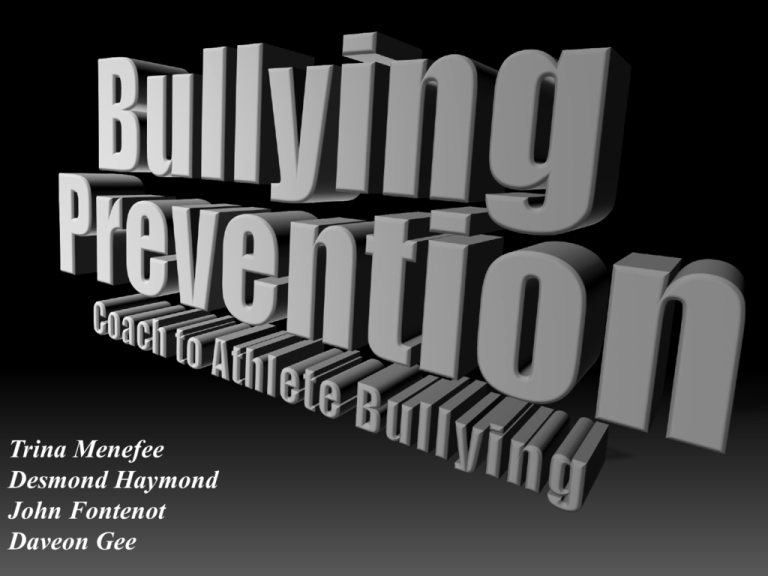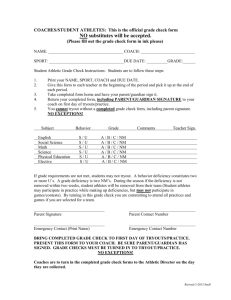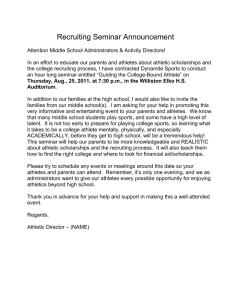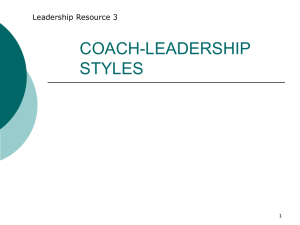Presentation - StudentAffairs.com
advertisement

Trina Menefee Desmond Haymond John Fontenot Daveon Gee Coaching Abuse • In today’s society we place so much importance on winning in sports that we blatantly neglect the needs and well being of the athletic. • When winning is more important to the coach than the experience of his/her players then sometimes emotional and physical abuse are the end result. • Coaching Abuse has become widely accepted in todays culture and often times over looked and not taken as a serious issue. The Abusive Coach • Regularly uses public embarrassment and humiliation to his/her athletes. • Rarely praises or use positive feedback with his/her players. • Creates a team environment based on fear and devoid safety. • Is more interested in his/her needs than those of their players. • Uses excessive conditioning as punishment. What should a athletes do if he/she feels bullied? • Confide in a friend. • Seek professional help with a counselor or higher ed. Administrator. • Have a private discussion with the coach and inform him/her on how their actions are affecting you. • If all else fails remove yourself from the situation. • If you are an athlete, realize that your physical and psychological health is of the greatest importance. Listen to your feelings, if you feel angry, ashamed, guilty, anxious or sad every time you come near your coach, you may need to seek help. You have a right to be treated with respect and dignity. Exercise that right. Stats on Coaching Abuse • A 2003 study by Dr. Stephen Joseph at University of Warwick found that “verbal abuse can have more impact upon victims’ self-worth than physical attacks, such as punching…stealing or the destruction of belongings.” Verbal attacks such as namecalling and humiliation can negatively affect self-worth to a dramatic degree. Rather than helping them to “toughen up,” 33 percent of verbally abused athletes suffer from significant levels of stress related disorders, like PTSD. This is the same disorder that haunts many war veterans and victims of violent assault. • The study, from Georgetown University Medical Center, surveyed 663 athletes from nine different universities and included 117 current in 10 different sports and 163 former athletes from 15 different sports. Researchers discovered the opposite of what they anticipated: Nearly 17 percent of the current college athletes had scores consistent with depression, compared to only 8 percent of the retired athletes. Stats on Coaching Abuse • Stress and athletics frequently go hand-in-hand. A season-ending injury or physical and verbal abuse from coaches could dishearten even the most upbeat college athlete. • Verbal and emotional abuse is much more common in athletics. It can lead to severe and long-lasting effects on the athlete’s social and emotional development. In a world where “more is better” in terms of training and “no pain means no gain,” there is a great deal of machismo in coaches. Most coaches coach the same way that they were coached while playing the sport growing up. This means that many coaches are still operating as if the training methods used in the Soviet Union in the 1970s are state of the art. “Ve vill deprive you of food until you win gold medal.” Central to this old school mindset is the idea that threat, intimidation, fear, guilt, shame, and name-calling are all viable ways to push athletes to excel. References • Schinnerer, J. (2009). The Consequences of Verbally Abusive Athletic Coaches. Psych Central. Retrieved on February 16, 2015, from http://psychcentral.com/lib/the-consequences-of-verbally-abusive-athleticcoaches/0001152 • “The Relationship Between Ethical and Abusive Coaching Behaviors and Student-Athlete Well-Being,” Mariya A. Yukhymenko, PhD, University of Illinois at Chicago; Thomas S. Paskus, PhD, National Collegiate Athletic Association; and Michael E. Brown, PhD, Pennsylvania State University-Erie; Sport, Exercise, and Performance Psychology; online July 7, 2014. References • Nancy L. Swigonski et al., Bullying Behavior by Athletic Coaches, Pediatrics, vol. 133, p. e273 (Feb. 2014); Douglas E. Abrams, A Coordinated Public Response to School Bullying, in Our Promise: Achieving Educational Equity for America’s Children (2009) • Ben Rohrbach, Another Youth Baseball Coach Arrested for Firing Pitches at “Inadequate” Player’s Head, http://sports.yahoo.com/blogs/highschool-prep-rally/another-youth-baseball-coach-arrestedfiring-pitches-inadequate-161137918.html (Sept. 5, 2013) References • Coach Beaned Player With Baseballs, Convicted of Assault, http://dfw.cbslocal.com/2013/08/07/coachbeaned-player-with-baseballs-convicted-of-assault/ (Aug. 7, 2013)







